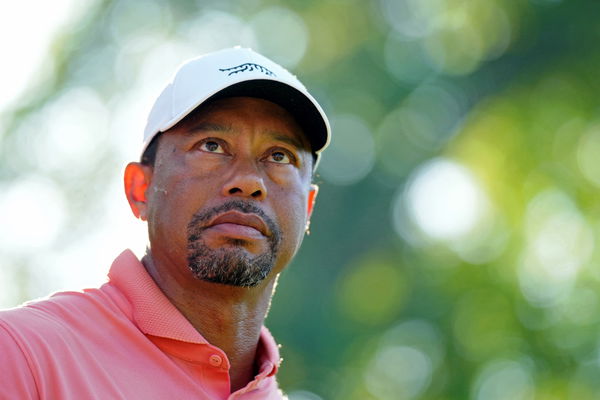
USA Today via Reuters
May 16, 2024; Louisville, Kentucky, USA; Tiger Woods looks on from the 11th tee during the first round of the PGA Championship golf tournament at Valhalla Golf Club. Mandatory Credit: Aaron Doster-USA TODAY Sports

USA Today via Reuters
May 16, 2024; Louisville, Kentucky, USA; Tiger Woods looks on from the 11th tee during the first round of the PGA Championship golf tournament at Valhalla Golf Club. Mandatory Credit: Aaron Doster-USA TODAY Sports
Imagine Luke Littler, a 17-year-old darts prodigy, being referred to as the “Tiger Woods of darts.” It is undoubtedly a bold assertion. What makes Littler so unique, though, and why are these parallels being drawn?
To begin with, his recent ascent to prominence in the PDC World Darts Championship, to become the youngest-ever champion, has captivated the sports world. Like Tiger Woods’ enthralling golf fans in the late 1990s, Littler’s moment seemed like a seismic shift in the world of sports entertainment, with 3.1 million viewers turning in for his spectacular success. The crucial question is whether darts’ fast-paced excitement can truly compete with golf’s attraction on a worldwide scale. Let’s see what golf and sports experts felt about darts taking over golf as the world’s most popular sport, with a focus on Littler’s potential and Barry Hearn’s bold claims.
ADVERTISEMENT
Article continues below this ad
Podcast analysis: A contentious discussion on Barry Hearn’s vision
In “Biggler than McIlroy,” the 96th episode of The Chipping Forecast, professional golfer Eddie Pepperell, sports analyst Andrew Cotter, and golf journalist Iain Carter engaged in a lively debate. The three discussed the former chairperson of the Professional Darts Corporation, Barry Hearn’s audacious assertion that darts, driven by rising ace Luke Littler and a $163 million investment, might overtake golf as the most popular sport in the world. Hearn’s claim was pointedly brought up at the start of the discussion: “Why would a sponsor pay $10 million for a golfer and only $1 million for a darts player?…. Golf is the target.”
Despite acknowledging Littler’s extraordinary talent, Cotter, who is renowned for his incisive analysis, questioned whether darts could compete with golf’s widespread popularity. “Golfers earn more because the sport is a massive global business. Darts is a brilliant game that I love, but it’s unlikely to ever achieve worldwide status on the same scale,” Cotter said, adding that it may not be fair to compare it to other sports. Providing views as an experienced player, Pepperell emphasized darts’ potential to flourish as a spectator sport because of its accessible nature and lively atmosphere.
He did, however, also voice concerns about the young prodigy’s welfare in light of Hearn’s lofty intentions. “In golf, Tiger Woods enjoyed a high level of autonomy over his career as he had the freedom to choose when and where he would play, and how he played. That autonomy created a good symbiotic relationship. If I were part of Luke’s family or close circle, I’d be worried about the risk of him being exploited,” Pepperell advised. As the show came to a close, they agreed that although darts are clearly on the rise, it would need consistent work overtime to overtake golf as the most popular sport in the world. In addition to the podcast’s observations, Let’s dig deeper to find out how Woods dominated his stardom.
ADVERTISEMENT
Article continues below this ad
Tiger Woods’ dominance of his route to stardom
The name of the golf icon who paved the way for his fame, Tiger Woods, evokes strength, independence, and global renown. Rather than giving in to outside pressure, Woods carefully weighs his health, professional objectives, and personal life when deciding when and where to participate. This independence guarantees that his involvement advances his career and the competitions he decides to enter. The PGA Tour granted Woods a unique exemption in celebration of his outstanding contributions to golf, which permits him to compete in Signature Events even though injuries have affected his ranking.

via Imago
Image Courtesy: IMAGO
What’s your perspective on:
Can Luke Littler truly become the Tiger Woods of darts, or is this comparison too far-fetched?
Have an interesting take?
The long-standing partnership with Nike, which demonstrated Woods’ authority over his brand, serves as an example of his other domination. Even after Nike left the golf equipment market in 2016, Woods kept wearing their clothes and selecting equipment that fit his tastes, such as Bridgestone golf balls and TaylorMade clubs. Tiger Woods has made a conscious effort throughout his career to keep control of his personal and commercial decisions. This exemption, which takes effect in 2025, demonstrates the respect he enjoys in the sport and his capacity to affect tour regulations.
ADVERTISEMENT
Article continues below this ad
But in Littler’s situation, his well-wishers should be concerned since he may be taken advantage of or swayed by some dominant figures. He is too young, and Hearn’s analogy between Littler and Woods puts pressure on him that could impair his performance and cause burnout or a lack of interest in the game. Striking a balance between his personal and professional goals might be an ideal way to move towards his goals. What do you think about Woods and Littler being compared? Let us know your thoughts in the comment section.
ADVERTISEMENT
ADVERTISEMENT
ADVERTISEMENT
ADVERTISEMENT


Can Luke Littler truly become the Tiger Woods of darts, or is this comparison too far-fetched?